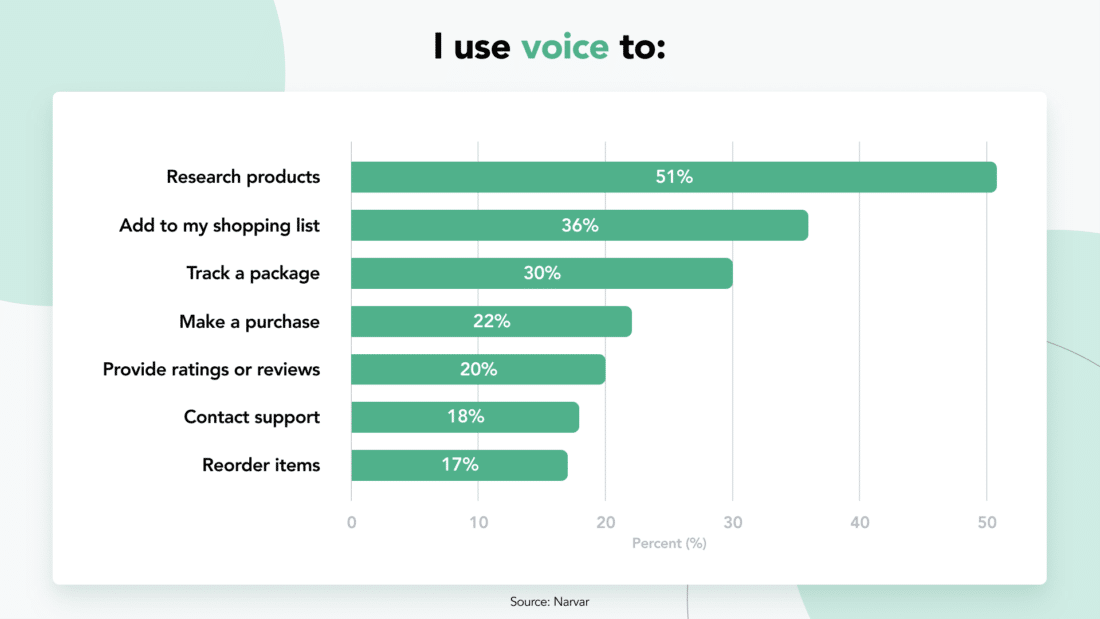Voice search is one of the most significant revenue opportunities for business—so why do only 3 to 5% of marketers invest in it?
Voice search is changing the way people interact with content. Optimizing your website for content and voice queries results will provide the answers people need when they need them. Voice search optimization is no longer an option for the digital marketer’s toolbox; it’s one of the permanent tools that’s here to stay.
People use voice search to ask questions, find local businesses, make purchase decisions and more. Smart speakers such as Amazon Echo and Google Home sold a record-breaking 150 million units in 2020, and it’s difficult to imagine going back to pre-smart speaker days.

According to PwC, 65% of 25- to 49-year-olds speak to their voice-enabled devices at least once per day. Voice assistants like Amazon’s Alexa, Google Home or Assistant, Siri, Android, and Cortana are used to make around 31% of mobile searches each week. Here are the search engines each of these assistants use for their answers:
- Google Home: Google
- Amazon Echo/Alexa: Bing
- Google Assistant: Google
- iPhone/Siri: Safari
- Android phones and devices: Google
- Microsoft Cortana: Bing
In 2020 people conducted roughly half of all online searches through voice search. Half of drivers report using voice search while driving. And this trend is readibly adopted by those under the age of 18 who currently make up half of all voice searches.

Why does this matter to brands? As we’ve seen a shift from brick-and-mortar to digital amplified over the global pandemic, more brands are serving users via their websites and apps. Voice search is now the number two preference for users searching on mobile devices.
What are people searching for when using voice?
According to a 2019 Microsoft survey, these are the most common ways people use digital assistants:
- 68% search for quick facts
- 65% search for directions
- 47% search for businesses
- 44% research products or services
In 2021, 58% of voice search questions are seeking location-based answers. Local businesses, retailers, and boutiques should optimize their local voice search SEO strategy. Invoca recommends local businesses optimize for local searches by providing an easily accessible phone number and street address; keeping your Google business listing updated; and, perhaps most importantly, add “near me” to everything: title tags, meta description, and anchor text. It’s critical to claim your Google My Business listing. This gives Google all the information it needs to understand what your business does, who it’s for, when it opens, where it is, and more.

How do websites engage in voice search optimization?
Voice search will be a $40 billion channel by 2022 so it is a significant revenue opportunity for companies to tap into. Here’s how voice search works:
- A person asks a voice assistant a question
- The voice assistant reads answers with a featured snippet then asks if you want to follow up with some other action
Featured snippets are search results that are featured at the top of Google’s organic results on SERPs (Search Engine Results Pages); 41% of all voice search answers came from a featured snippet. Marketers should also pay attention to On-SERP SEO in order to optimize content so it can be a featured snippet. Here are some ways to optimize content for SERPs using voice search SEO:
- Create content to answer specific questions
- Organize content in Q&A format
- Create high-quality content
Nearly 20% of all voice search queries are triggered by a set of 25 keywords. These consist mainly of question words like “how” or “what” and adjectives such as “best” or “easy.” Users are more likely to be conversational in asking questions and speaking with a voice assistant. Creating answers to commonly asked questions and then answering it in the simplest and most direct way is key to optimizing your website’s content.

Customize Your Voice
Marketers can best optimize voice search through customizing content to 29 words long and written at a 9th grade level. The average word count of a voice search result page is 2,312 words, meaning Google sources voice search answers from long-form content. Content should be organized in lists, tables or paragraphs that are well structured and easy to read aloud. It’s also important to take into consideration how Google evaluates speech result quality. It takes into account length, information satisfaction, formulation, and potential elocution of your content.
As with all things SEO, your website speed and design are Google ranking factors. Your website must be designed as mobile-first and all of your content needs to be optimized for mobile. Website page speed matters a great deal in voice search optimization. Backlinko found the average voice search result page loads in 4.6 seconds (52% faster than the average page). Google is prioritizing speed in all of its searches and marketers should be very familiar with their site’s Google’s PageSpeed Insights. Speed is another Google ranking factor, which gives faster sites a voice SEO advantage.

What are voice SEO website enhancements?
Google Assistant uses a website’s content as well as Google Actions for its answers. Google Actions is a developer’s tool that once implemented into your website can “expand your voice discoverability, allowing you to better understand your user’s voice behavior too, giving you a competitive advantage,” according to Aleyda Solís.
Additionally, implementing speakable schema markup will help identify portions of your website that are particularly appropriate for reading aloud. Google’s speakable schema markup allows you to tell digital voice assistants what you want to be said for the content on a page.
To deploy this markup, here are a few things to consider from Edufficient:
- Speakable markup for text content only (no photo captions or source attributions).
- Don’t use speakable on the entire article. Use it only for key points.
- Speakable text should be just a few sentences and take no more than 30 seconds to read.
- The story should be broken up into short consumable sentences or ideas.
What do marketers need to do about voice SEO?
First you need to know your audience. Once you know who you are marketing to, then you can dive into how each of your personas uses voice search. “The oldest searchers love their Alexa, making Amazon SEO and developing Skills a smart initiative for companies targeting that audience,” according to Search Engine Land. However, users under 21 conduct most of their voice searches through Siri, which “underscores the importance of optimizing one’s business listing on Apple Maps, or ensuring apps are optimized for the App Store.”
Second, you need to update your content using the above recommendations. In summary, keep it easy to read, answer questions in a conversational voice, and implement Google’s best practices.
Third, you need to update your SEO to include your long tail keywords. Long tail keywords are the longer questions asked that your content can answer. The theory around long tail keywords is there is less competition around those keywords making it easier to rank for those terms. Long tail keywords are specific and more geared toward questions, like ones used in voice search.

While voice search isn’t new, it’s definitely where people are looking more and more for their answers. It is on an exponential growth trajectory and if your website is optimized, it will open up your product or service to people at the height of their need. By priming your website for voice search optimization, including content and responses, you’ll soon find your way into new revenue streams.
Feature image by Lazar Gugleta on Unsplash





Julia Davis on
It was such a great article which was on optimizing ecommerce websites. Optimizing an eCommerce website for voice search is essential due to several reasons:
1.Growing popularity of voice search
2.Convenience and ease of use
3.Changing search behavior
4.Enhanced user experience
5.Competitive advantage
6.Mobile and smart speaker compatibility
These are some points which I wanted to include in your article. Readers, if you want to develop your ecommerce website, you can visit an IT company like Alakmalak technologies. They have 17+ years of experience in this field.